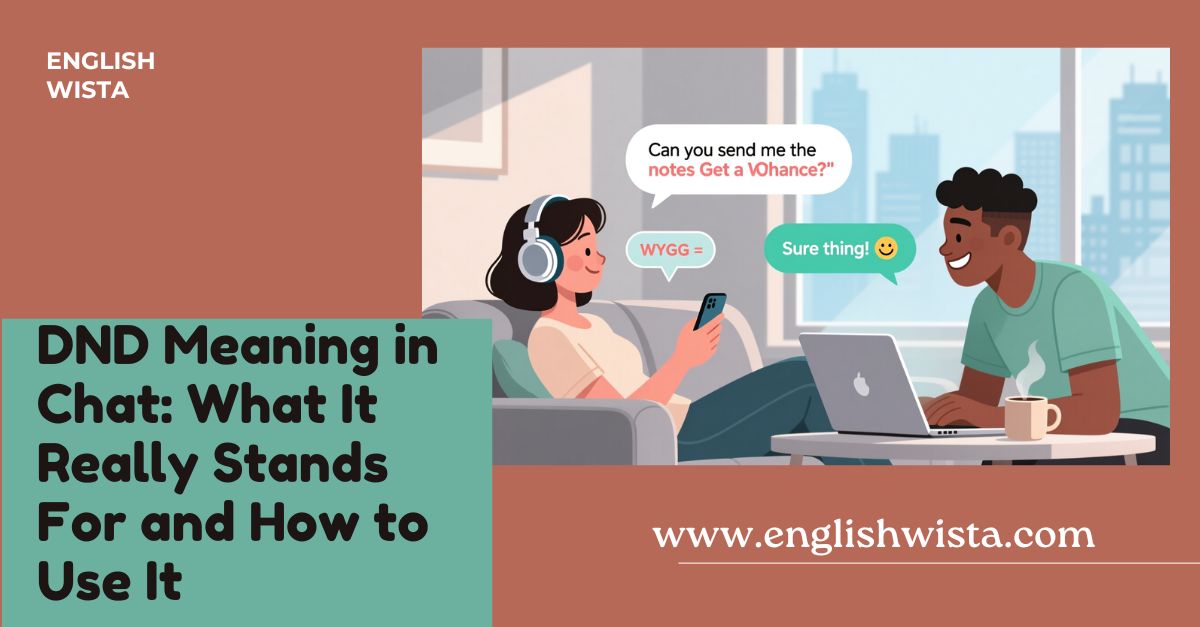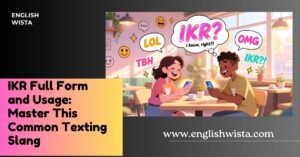Have you ever seen the letters “DND” pop up in a chat and wondered what it means? Maybe a friend sent you a message that said, “Busy rn, DND,” and you weren’t sure if they were upset or just busy. Don’t worry you’re not alone! Internet slang can be confusing at first, especially with all the short forms and acronyms people use in texting, social media, and apps like Snapchat or WhatsApp.
In this article, we’ll take a deep dive into the meaning of DND in chat. We’ll keep things simple, fun, and beginner-friendly. By the end, you’ll not only understand what it means, but you’ll also know how to use it confidently in your own conversations.
So, let’s get started what exactly does DND mean?
What Does DND Mean in Chat?
In most online conversations, DND stands for “Do Not Disturb.”
It’s a quick way of telling someone that you’re busy, unavailable, or simply don’t want to be bothered at the moment. Think of it as a polite little sign you hang on your virtual door. Instead of writing a long explanation like, “Sorry, I’m working and can’t reply right now,” you can just type DND.
For example:
- “I’ll call you later, in a meeting rn, DND.”
- “Studying for finals. DND pls.”
It’s short, clear, and easy to understand once you know it.
Why Do People Use DND Instead of Writing It Out?
You might wonder: why not just type “Do Not Disturb”?
The answer is simple speed and convenience. People love shortcuts when texting. Instead of using many words, acronyms like DND help us save time. They also make messages look more casual and less formal.
Plus, many apps and phones already have a “Do Not Disturb” mode, which silences notifications. Since the feature is called DND in settings, people carried that same short form into their chats.
Common Situations Where You’ll See DND
To understand better, let’s look at the typical moments when people use DND in chat.
- When studying or working:
- “Can’t talk rn, DND until 5 pm.”
- “Exam tomorrow. DND, wish me luck!”
- During meetings or calls:
- “In a meeting, DND pls.”
- “On Zoom. DND.”
- While gaming or streaming:
- “Ranked match rn, DND.”
- “Streaming live. DND or join chat later.”
- When needing quiet time:
- “Taking a nap, DND.”
- “Mental health break. DND for a while.”
As you can see, the meaning is the same, but the situation changes.
Is DND Always Polite?
This is an important question. Sometimes, people think writing DND sounds rude because it’s so short. But actually, it depends on the tone and the situation.
For example:
- If you text just “DND.” with no explanation, it might sound harsh.
- But if you add a friendly note, it feels polite:
- “Hey! Working right now, DND but I’ll message you later.”
- “Studying, DND. Catch up soon!”
So, the secret is to balance it. Add a little warmth if you don’t want to sound cold.
Does DND Always Mean “Do Not Disturb”?
Mostly, yes. But here’s the fun part: in some contexts, DND can mean different things.
For example:
- In the gaming world, especially Dungeons & Dragons, DND stands for the famous role-playing game.
- In some technical settings, DND might mean “Do Not Delete” or “Do Not Duplicate.”
- But in everyday chat, texting, and social media, the most common meaning is Do Not Disturb.
So, unless you’re in a very specific conversation about games or work, you can assume DND = Do Not Disturb.
Real-Life Example Sentences Using DND
Let’s practice with some sentence examples. These will help you see how people use DND naturally.
- “Hey, I’m going into class, DND till 2.”
- “Movie night with fam. DND.”
- “Gym time 💪 DND.”
- “Working on a project, DND for a few hours.”
- “I’ll be free later, DND rn.”
Notice how short and casual these sentences are. You don’t need to add much DND speaks for itself.
How Is DND Different from Similar Phrases?
You might see other ways people tell others they’re busy. Let’s compare.
- BRB (Be Right Back): Means you’re stepping away for a short time but will return soon.
- AFK (Away From Keyboard): Common in gaming; means you’re not active at the moment.
- Busy: A simple word, but less specific than DND.
DND is different because it directly asks others not to disturb you. It’s stronger than just “busy.”
Example comparison:
- “Busy rn” = I’m occupied but might still check messages.
- “DND rn” = Please don’t message or call me right now.
Fun Facts About DND
Here are a few extra things you might find interesting:
- The term “Do Not Disturb” has been around for decades it started with hotel signs! Guests would hang a “Do Not Disturb” sign on their door when they didn’t want housekeeping or interruptions.
- Phones later adopted the same phrase for their silence settings.
- Today, it has spread into casual texting and online slang as DND.
- Many messaging apps like WhatsApp, Telegram, or Discord even have custom DND status modes.
So the next time you see DND, you can imagine it as that tiny hotel sign just in digital form.
Tips for Using DND in Chat
If you want to start using DND in your own chats, here are a few quick tips:
- Use it when you really can’t reply. Don’t overuse it or people might feel ignored.
- Add context. A short reason makes it sound friendlier. Example: “Studying rn, DND.”
- Combine with emojis. Emojis soften the tone. Example: “Sleeping 😴 DND till morning.”
- Respect others’ DND. If someone tells you “DND,” don’t keep messaging them it’s polite to wait.
Quick Definitions for Beginners
Here’s a simple recap definition you can remember:
- DND (Do Not Disturb): An acronym used in chat to say “don’t message me right now, I’m busy or unavailable.”
Common Misconceptions About DND
Let’s clear up some confusions people sometimes have.
- Misconception 1: DND means someone is angry at you.
- Truth: Most of the time, it just means they’re busy. Don’t take it personally.
- Misconception 2: DND is rude.
- Truth: It’s only rude if used without context. Add a smiley or explanation, and it’s polite.
- Misconception 3: DND is only for work.
- Truth: People use it for all kinds of activities studying, relaxing, or even gaming.
DND in Different Apps and Platforms
To make things even clearer, let’s see how DND shows up in popular apps:
- WhatsApp: People might type “DND” in their status or chats.
- Snapchat: Used in snaps or streak messages to show they can’t reply.
- Discord: Has a built-in DND status with a red dot.
- iPhone/Android: The phone setting itself is called “Do Not Disturb (DND).”
This shows how universal the acronym has become.
Conclusion
So, what have we learned? DND in chat simply means “Do Not Disturb.” It’s a quick and polite way to tell others you’re busy or unavailable. People use it when studying, working, gaming, or just needing quiet time.
Remember, DND isn’t rude unless you make it sound that way. Add a little context, maybe an emoji, and people will understand you’re just setting healthy boundaries.
Next time you see someone write “DND,” you’ll know exactly what they mean. And if you want to start using it yourself, go for it it’s one of the easiest and most useful acronyms in online chat.
After all, sometimes we all need a little “Do Not Disturb” time, right?



